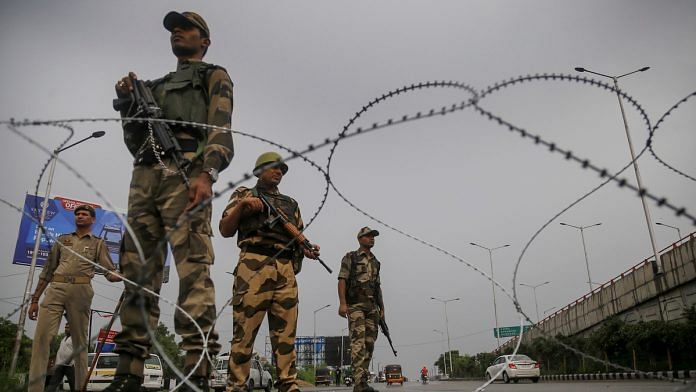Srinagar: Eight patients have been admitted with pellet injuries at Srinagar’s Shri Maharaja Hari Singh Hospital, the main medical facility in the J&K capital, since the Modi government announced its decision to do away with Article 370 Monday.
The number, officials of the state administration told ThePrint, is much lower than what they expected. This low an injury count in the first three days of the crisis, they said, suggests that there is calm in the Valley despite the removal of the J&K’s special status and statehood.
One official said there was no way of knowing if other injured people had been able to get an ambulance. Officials talked about one death, in Palpora on Srinagar’s outskirts, but said it could not be associated with the current situation pending an investigation.
“We are not sure about the reason behind the death. Some people say that he was taking a bath and he drowned, while others say he was chased by security forces during clashes, following which he jumped into the river,” said an employee at SMHS.
On a standstill
The curfew-like restrictions in place in Kashmir since Monday have brought the Valley to a standstill.
Essential services remain affected, while main roads and highways continue to be manned by thousands of personnel from the Jammu & Kashmir police and paramilitary forces.
Mobile connectivity, landlines, internet services and even local cable TV are blocked, while authorities are said to be communicating with each other through around 300 satellite phones given to them by the central government.
In Srinagar alone, hundreds of checkpoints have been established: While traffic is allowed in certain locations, far stricter restrictions have been imposed in more sensitive parts of the city.
A lot, however, depends on one’s negotiating skills. At certain checkpoints, some vehicles and individuals are allowed to pass, seemingly depending on the mood of the official in charge.
Ambulances and patients are allowed, but other civilians, including government officials, face questioning. Media professionals face even more scrutiny. Journalists are being denied curfew passes and are forced to plead with officers posted at checkpoints for permission to go past.
“Why do you want to go to Lal Chowk? What will you write? You people wreak havoc,” said one paramilitary officer deployed at Abdullah Bridge, which connects Lal Chowk to the rest of the city.
Another officer remarked while checking media or ID cards, “You people are journalists? It doesn’t seem so. You look like (deceased Hizbul Mujahideen commander) Burhan Wani’s brothers.” On both occasions, this reporter and four others were allowed to pass.
TV journalists, meanwhile, have been able to operate and send their dispatches through outdoor broadcasting vans.
Other civilians face a harder time. A youngster travelling on a scooter was stopped at a checkpoint in Rajbagh. “I was at my relatives’ house and want to go back to my home,” he said. He was quickly turned back.
Also read: Will Modi govt move on Kashmir’s Article 370 stand the scrutiny of Supreme Court?
Endless wait
At the office of Srinagar deputy commissioner Shahid Chowdhury, ThePrint saw dozens waiting for a curfew pass.
One of them was an executive engineer, making desperate entreaties for a pass for himself and his staff at a power station.
“Sir, I will be suspended from my job,” he said to one of the additional deputy commissioners, who looked at him helplessly.
“We are trying our best to issue the passes, just have patience,” the commissioner replied. Much later, a printout is pasted outside the same office. “No curfew pass issued — by order of the District Magistrate.”
A senior state government employee said he had been waiting two days to get curfew passes. “We had some urgent work. But we haven’t been issued passes. I have been waiting for two days,” the official added.
‘Dark night that doesn’t end’
At SMHS Hospital, ThePrint heard some harrowing stories from those accompanying patients. Umar, an auto-driver from Srinagar who brought in a kidney patient, recalled how the latter’s relatives had arrived at his door in search of a ride to the hospital.
“On Wednesday morning, some people knocked on my door and asked if I had an auto. They told me they had looked for auto-drivers in several localities, to take their father to hospital, before they reached my home,” he added.
A woman named Haneefa said she was lucky enough to find a cab and pass through the checkpoints while bringing in her 14-year-old son Tuesday.
However, she had been unable to find a vehicle to take her son back home to Beerwah in Budgam district once he was discharged.
“People are saying they don’t mind taking us to our home, but they are not sure they will be allowed to move,” she added. “No one knows what is happening around them. It’s like a dark night which refuses to end.”
Also read: Imran Khan warns revoking Article 370 could spark India-Pakistan war




Just 8? & that too with pellets! What on earth is par military doing? Crores & Crores of Rs spend on training & ammunition & what ROI we get? Just 8 pellets!